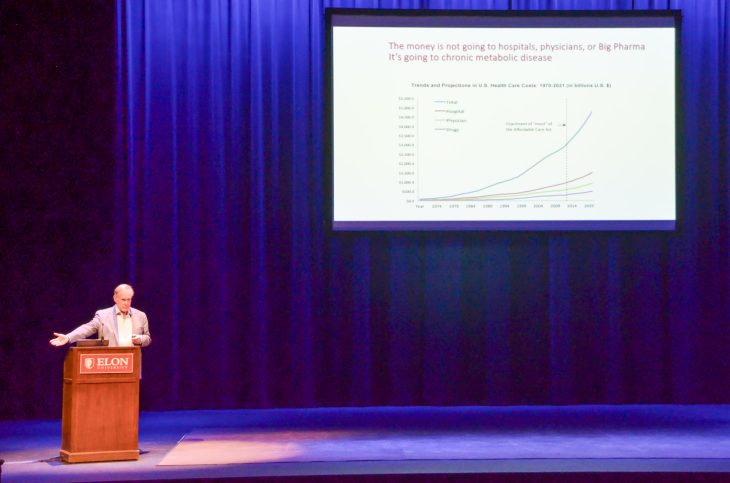Specializing in metabolism and nutrition, Lustig helped listeners learn the ways food choices contribute to common disease and metabolic syndrome in this Voices of Discovery series lecture.
Endocrinologist Dr. Robert Lustig lectured about the role processed food play can play in common diseases on Tuesday, Sept. 20. His talk, part of the university’s Voices of Discovery series, drew a robust crowd of university and community residents to McCrary Theater.
Lustig’s book, “Metabolical: The Lure and the Lies of Processed Food, Nutrition, and Modern Medicine” unpacks the pathologies that underlie chronic disease, and how the increasing reliance on processed food by Americans has ruined people’s health, picked their pockets and destroyed their way of living over the past 50 years.
“All of America is sick,” Lustig explained.

Lustig began to explain the true definition of ultra-processed food and uses the “Nova” system of classification, formulated by colleague Carlos Monteiro, professor of Nutrition and Public Health at the University of Sao Paulo, Brazil, to categorize food with their nutrition levels. Nova class 1 would be an apple picked freshly off a tree, while Nova class 4 would be a McDonald’s apple pie.
“Here’s the problem: 73% of the U.S. food supply is in that Nova class 4,” Lustig explained. “But Nova class 4 is the only food group associated with metabolic disease. But it’s 73% of the grocery store. So basically, when you walk into the grocery store, you have a 1 out of 4 chance of walking out alive.”
Although Lustig’s claims are terrifying, they draw from his extensive research and real-life experiences. Only 7% of Americans are considered metabolically healthy, while the other 93% are suffering from some sort of diagnosable metabolic dysfunction, Lustig explained. Though these dysfunctions may not be treatable, they are preventable through the consumption of foods that nourish our “Lamborghini.”
Throughout the talk, Lustig compares the human body to a Lamborghini — a high-end vehicle that we need to clean and repair with food, or else we risk turning it into a jalopy. The food we eat travels directly to the mitochondria, the powerhouse of the cell, which can be sustained or damaged by what we feed it. Therefore, the true determinant of our metabolic health is the state of our cells. Lustig claims that to stay in a state of nutrition, we need more fiber to feed the gut, less sugar to protect the liver, and more Omega 3 fatty acids to support our brains.
“The challenge is going from knowledge to transformation,” Lustig says. “You can know all the right things, but if you don’t have access or can’t afford it, it doesn’t really matter, does it?”
Lustig is currently working for a nonprofit organization called Eat REAL, which is dedicated to getting real food in K-12 schools right now in California. Although the process is a challenge, this practice will be implemented in more places over time with the spread of knowledge and support from donors.
Click here to learn more about Lustig and his mission.


